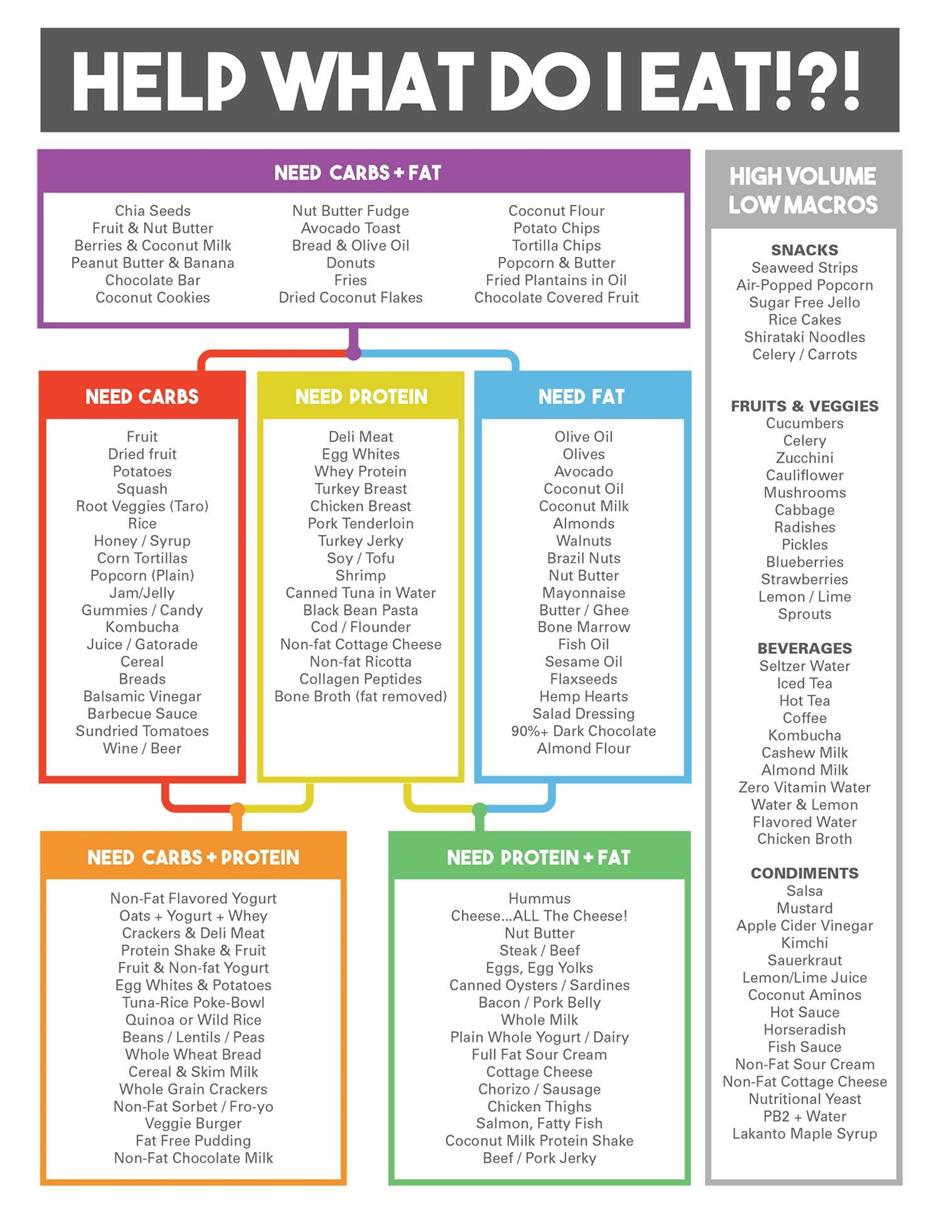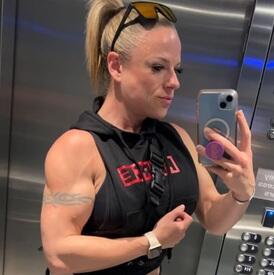Macros for dummies

laurenkwinn
Posts: 2 Member
Hey there! I just started with MyFitnessPal and signed up for it to tell me my macro info.
Here's a few things I've run into today:
- I don't think I'm going to use all of the allotted calories...I'm not supposed to eat all of those if I'm not hungry for them, right?
- Same kind of deal with the macro counter. If I'm not hungry for more food, what happens if I don't hit all the macros?
Any tips? I want to do it right but I get overwhelmed by all the websites I've been searching on trying to find the answer.
Here's a few things I've run into today:
- I don't think I'm going to use all of the allotted calories...I'm not supposed to eat all of those if I'm not hungry for them, right?
- Same kind of deal with the macro counter. If I'm not hungry for more food, what happens if I don't hit all the macros?
Any tips? I want to do it right but I get overwhelmed by all the websites I've been searching on trying to find the answer.
Tagged:
0
Replies
-
Hi! I've been a macro counter for years and I think it comes down to your goals - if you're trying to gain weight, you're going to want to get those calories in - eat'em if you got'em!
If you're looking to lose weight, I'd do my very best - oftentimes folks under eat and it becomes unproductive and unhealthy because your body isn't getting what it needs.
If you need some support in trying to economize or find ways to get those macros in, send me a friend request - I'd be more than happy to give you some tips on how I've made it work for the years (115lbs lost; purposeful regain for bodybuilding & multiple contest preps over the years!)
Wishing you well!!3 -
Thank you so much!!! I will ☺️0
-
I wouldn’t force yourself to eat if you aren’t hungry. If you don’t hit all the macros then… I will end up burning my popcorn. Hit those macros. Just kidding, it’s not the end of the world. I would place an emphasis on protein though0
-
When trying to lose weight, I consider the calorie goal a maximum and the macro goals to be minimums.
Calories: If I'm not too hungry for all the calories one day I'm pretty sure I will be the next day. Eating too few calories is not a problem I have. Ever. Many people "bank" calories for the weekend. It's average intake over time that matters.
Macros: I track fat, protein and fiber. (There is no minimum or maximum for carbohydrates so I don't track them.) I look at my weekly average macros more than daily macros. As long as I am reaching the minimums ON AVERAGE, I don't worry about it too much.1 -
laurenkwinn wrote: »Hey there! I just started with MyFitnessPal and signed up for it to tell me my macro info.
Here's a few things I've run into today:
- I don't think I'm going to use all of the allotted calories...I'm not supposed to eat all of those if I'm not hungry for them, right?
- Same kind of deal with the macro counter. If I'm not hungry for more food, what happens if I don't hit all the macros?
Any tips? I want to do it right but I get overwhelmed by all the websites I've been searching on trying to find the answer.
Nothing happens if you don't hit your macros. They just defaults. Macros make up your calories...roughly 4 calories per gram of carbohydrate, 4 calories per gram of protein, and 9 calories per gram of dietary fat. MFP's defaults are just defaults...there isn't anything magical about them. There isn't any universally optimal macro ratio. Macro ratios are very individual as per physical performance, energy, satiety, and to some extent body composition.
In regards to hitting your calorie targets, leaving a few on the table isn't a big deal...or having a day here and there where you're just not getting adequate calories...but substantially undereating what is already a large deficit on a regular basis can cause some major issues.5 -
Kait_Dee I would really like some help with meeting macros. It seems easy enough until I get to the end of the day and see that I'm short in some areas.0
-
Others are right: Calories are what's directly linked to weight loss. Macros are for health, body composition, satiation, energy level, and that sort of thing - that's important stuff, too, though.
Macros (and other nutrients) can indirectly affect weight loss: If we get sub-par nutrition (or too low calories), and have less energy, we'll probably subtly rest more and do less in daily life, burn fewer calories, lose weight a little slower. If we get sub-par nutrition (or too low calories), we may have more trouble with fighting cravings/appetite, so not be able to stick with our calorie goal long enough to lose weight. But it's still calories that have the direct effect on weight.
If you do decide you want to work on getting closer to macro goals, what helped me with fine-tuning macros to where I wanted them was using my food diary as a tool.
,
Every few days, I'd review my food log, and notice patterns. If I was persistently under on something, and wanted to improve that, this is what I'd do:
1. First, look for foods that were contributing relatively many calories to my day, but weren't so important to me for feeling full, for nutrition, or for tastiness/happiness - things that in that sense weren't worth the calories I was spending on them, to me. Those were foods I could consider reducing or eliminating, to make calorie room for foods that would better help me meet my goals. (Often, they were things I was eating more out of habit than true enjoyment.)
2. Then, I'd try to identify foods I personally like eating that were good sources of the nutrient I wanted to increase. (More about how to do that later in this post.) I'd try out a new eating pattern, with those new foods replacing part or all of the "not worth so many calories foods". If those new foods worked out, I'd keep them in rotation. If not, I'd try something else.
Over time, by repeating that "review and adjust" pattern, my routine eating habits converged on the nutrition I wanted to be accomplishing, while still eating in a way that I enjoyed. In essence, my eating habits gradually got better.
I personally would not feel comfortable posting something like "message me or friend me for tips". When someone does that, I wish they'd give their tips right here in MFP public, where other readers could potentially benefit. (Also, it makes me wonder if they're selling something. We used to have a lot of "coaches" from a multi-level marketing company (I won't name the company) that did that "PM me for info" thing. I hope no one would do that hidden marketing now . . . but that's another reason I wouldn't do that, personally.)
Instead, I sometimes post these horrifying long essays, which I guess is bad in another way. 🤷♀️ Can't win!
MFP's macro defaults aren't terrible for most people, but they aren't magically ideal for all, either. They can be adjusted based on experience, or based on more individualized nutritional guidance. For individual nutritional reasons, some people prefer to estimate macro needs in grams, and eat to those goals. Some sources of information that I found useful for that are:
This thread in MFP from a trainer type who used to post here:
https://community.myfitnesspal.com/en/discussion/819055/setting-your-calorie-and-macro-targets/p1
(Scroll down a bit for the macro-specific part.)
This personalized estimator from USDA (which, for my taste, lowballs protein for the cases of active people, aging people, or people in a calorie deficit):
https://www.nal.usda.gov/fnic/dri-calculator/
This research-based protein needs estimator (and explanation) from a respected site (that doesn't sell protein supplements):
https://examine.com/nutrition/protein-intake-calculator/
https://examine.com/guides/protein-intake/
If you're having trouble getting enough protein specifically, this thread may be helpful:
https://community.myfitnesspal.com/en/discussion/10247171/carbs-and-fats-are-cheap-heres-a-guide-to-getting-your-proteins-worth-fiber-also
I have another good resource about protein for people over 55-60, who have some specialized needs, but OP looks younger. If anyone wants that, say so, and I'm happy to post it.
If you're having difficulty getting other macros, there are lots of charts on the web like this one:
Or just do a web search for "food sources of protein" or whatever nutrient's of interest. (Obviously, watch out for biased advocacy sites, people selling products - stick with mainstream good sources like USDA, other government health/nutrition authorities, major respected clinics/universities, and that sort of thing.)
You can also post in the "Food and Nutrition" section of the MFP Community, and ask a specific question there ("I keep coming up short on healthy fats, but I still have calories: What foods do you like, in that situation?" - that kind of thing.)0
Categories
- All Categories
- 1.4M Health, Wellness and Goals
- 391.3K Introduce Yourself
- 43.5K Getting Started
- 259.7K Health and Weight Loss
- 175.6K Food and Nutrition
- 47.3K Recipes
- 232.3K Fitness and Exercise
- 388 Sleep, Mindfulness and Overall Wellness
- 6.4K Goal: Maintaining Weight
- 8.5K Goal: Gaining Weight and Body Building
- 152.7K Motivation and Support
- 7.8K Challenges
- 1.3K Debate Club
- 96.4K Chit-Chat
- 2.5K Fun and Games
- 3.2K MyFitnessPal Information
- 22 News and Announcements
- 908 Feature Suggestions and Ideas
- 2.2K MyFitnessPal Tech Support Questions





